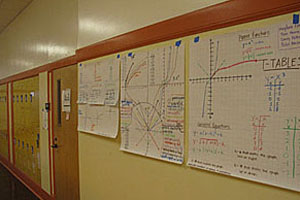 Photo: Kristina RizgaLast year, battles over charter schools dominated much of education coverage. This year, the controversy over “teacher evaluations” is poised to be the biggest fight among people with competing visions for improving public schools. For a primer on how these new teacher assessments work, don’t miss Sam Dillon’s recent piece in the New York Times. Reporting from Washington, DC, Dillon found that last year the city fired 165 teachers using a new teacher evaluation system; this year, the number will top 200.
Photo: Kristina RizgaLast year, battles over charter schools dominated much of education coverage. This year, the controversy over “teacher evaluations” is poised to be the biggest fight among people with competing visions for improving public schools. For a primer on how these new teacher assessments work, don’t miss Sam Dillon’s recent piece in the New York Times. Reporting from Washington, DC, Dillon found that last year the city fired 165 teachers using a new teacher evaluation system; this year, the number will top 200.
DC relies on a relatively new evaluation system called Impact—a legacy of its former school chief Michelle Rhee, who noticed that, despite the district’s low test scores, most teachers were getting nearly perfect evaluations. Rhee and the proponents of this new evaluation system feel that the old system relied too much on the subjective evaluations by the principal or a few experienced teachers. Opponents of the old system say these internal measurements are not data-driven or rigorous enough to allow principals and districts to identify struggling teachers who need assistance or to find the successful ones who deserve to be recognized and empowered.
Impact or other new evaluation systems are currently being implemented in around 20 states. The basic idea to use performance-based evaluations that use external measures such as test scores in addition to the internal measures mentioned above. Sparked by President Obama’s Race to the Top grants, these “value-added” evaluations rely heavily on kids’ test scores in math and reading. Teachers whose subjects are not measured by test scores are observed in the classroom. For example, DC teachers get five yearly classroom observations, three by principals and two by “master educators” from other schools.
My reaction to these developments after nine months of reporting at San Francisco’s Mission High School? Mission wasn’t using value-added evaluations last year, but I talked to many teachers about testing, and saw firsthand that test scores don’t show a lot of important stuff, such as students’ critical-thinking or problem-solving skills. In many cases test scores simply showed that students could read, memorize, and follow directions. Teachers at Mission want less reliance on test scores and more reliance on multiple internal measures such as students’ grades, attendance, and attrition rates; parent and student satisfaction surveys; and peer reviews. Many teachers believe that this local context measures a school’s performance more authentically than standardized test scores.
This also reminds me of an illuminating debate I heard at the NewSchools and Aspen Institute education reform Summit I caught last month. Roxanna Elden, a public school teacher and author of See Me After Class: Advice for Teachers by Teacher, was asked to comment on current evaluation systems like Impact. “I don’t want to evaluate teachers in reading and math based on test scores alone,” Elden responded. “I’ll give you an example: A fourth-grade teacher in Atlanta stopped tutoring third-grade kids because they won’t advance as much as they enter her grade, and she could lose her job. That’s value-added Impact for you.” Relying too much on test scores can erode collaboration between teachers. “There should be a smarter balance between a review between the principal, peers, and external measures.”
The trouble is that there is no agreement among teachers or education wonks on what the right balance between internal (grades, peer reviews, attendance) and external (test scores) measures should be, or even whether we should assess individual teachers or entire schools to discourage competitiveness between teachers. That doesn’t mean we shouldn’t try, because we do know that while poverty accounts for much of students’ achievement gap, within a school, teachers make a bigger difference than any other variable.
But the proponents of the new “value-added” teacher evaluation often sound like they’ve confused the more advanced questions with the answer. Elden’s suggests that education reformers spend more time talking with teachers to avoid unintended consequences like firing teachers who want to work with the most challenging students. Hire teachers from diverse backgrounds and varying viewpoints to develop these systems, not just policy wonks or teacher union reps, she says. “Realize that schools are deeply collaborative communities and setting up competition will not always be the best thing for the kids.”
















